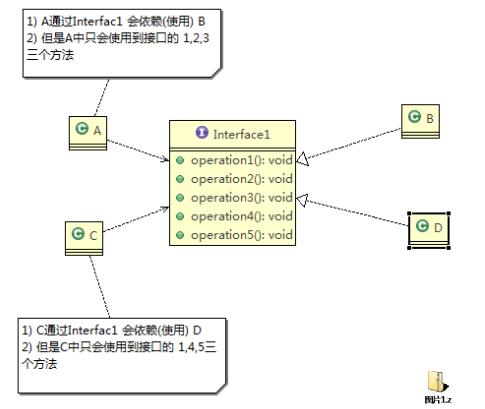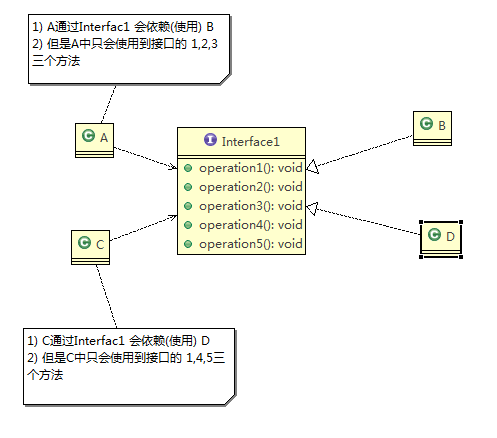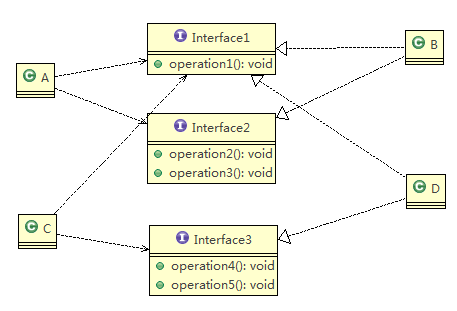接口隔离原则(Interface Segregation Principle)
一、基本介绍
1、客户端不应该依赖它不需要的接口,即一个类对另一个类的依赖应该建立在最小的接口上
2、先看一张图

3、类 A 通过接口 Interface1 依赖类 B,类 C 通过接口 Interface1 依赖类 D,如果接口 Interface1 对于类 A 和类 C 来说不是最小接口,那么类 B 和类 D 必须去实现他们不需要的方法。
3、按隔离原则应当这样处理:将接口 Interface1 拆分为独立的几个接口,类 A 和类 C 分别与他们需要的接口建立依赖关系。也就是采用接口隔离原则。
二、应用实例
1、类 A 通过接口 Interface1 依赖类 B,类 C 通过接口 Interface1 依赖类 D。(未使用接口隔离)

代码案例:
public class Segregation1 {
public static void main(String[] args) {
}
}
//接口
interface Interface1 {
void operation1();
void operation2();
void operation3();
void operation4();
void operation5();
}
class B implements Interface1 {
@Override
public void operation1() {
System.out.println("B 实现了 operation1");
}
@Override
public void operation2() {
System.out.println("B 实现了 operation2");
}
@Override
public void operation3() {
System.out.println("B 实现了 operation3");
}
@Override
public void operation4() {
System.out.println("B 实现了 operation4");
}
@Override
public void operation5() {
System.out.println("B 实现了 operation5");
}
}
class D implements Interface1 {
@Override
public void operation1() {
System.out.println("D 实现了 operation1");
}
@Override
public void operation2() {
System.out.println("D 实现了 operation2");
}
@Override
public void operation3() {
System.out.println("D 实现了 operation3");
}
@Override
public void operation4() {
System.out.println("D 实现了 operation4");
}
@Override
public void operation5() {
System.out.println("D 实现了 operation5");
}
}
/**
* A 类通过接口 Interface1 依赖(使用)B类,但是只会用到1,2,3方法
*/
class A {
public void depend1(Interface1 i) {
i.operation1();
}
public void depend2(Interface1 i) {
i.operation2();
}
public void depend3(Interface1 i) {
i.operation3();
}
}
/**
* C 类通过接口Interface1 依赖(使用) D类,但是只会用到1,4,5方法
*/
class C {
public void depend1(Interface1 i) {
i.operation1();
}
public void depend4(Interface1 i) {
i.operation4();
}
public void depend5(Interface1 i) {
i.operation5();
}
}
2、使用接口隔离原则改进
(1)类 A 通过接口 Interface1 依赖类 B,类 C 通过接口 Interface1 依赖类 D,如果接口 Interface1 对于类 A 和类 C 来说不是最小接口,那么类 B 和类 D 必须去实现他们不需要的方法。
(2)将接口 Interface1 拆分为独立的几个接口,类 A 和类 C 分别与他们需要的接口建立依赖关系。也就是采用接口隔离原则。
(3)接口 Interface1 中出现的方法,根据实际情况拆分为三个接口。

代码示例:
public class Segregation2 {
public static void main(String[] args) {
A a = new A();
a.depend1(new B()); // A类通过接口去依赖B类
a.depend2(new B());
a.depend3(new B());
C c = new C();
c.depend1(new D()); // C类通过接口去依赖(使用)D类
c.depend4(new D());
c.depend5(new D());
}
}
//接口1
interface Interface1 {
void operation1();
}
//接口2
interface Interface2 {
void operation2();
void operation3();
}
//接口3
interface Interface3 {
void operation4();
void operation5();
}
class B implements Interface1, Interface2 {
@Override
public void operation1() {
System.out.println("B 实现了 operation1");
}
@Override
public void operation2() {
System.out.println("B 实现了 operation2");
}
@Override
public void operation3() {
System.out.println("B 实现了 operation3");
}
}
class D implements Interface1, Interface3 {
@Override
public void operation1() {
System.out.println("D 实现了 operation1");
}
@Override
public void operation4() {
System.out.println("D 实现了 operation4");
}
@Override
public void operation5() {
System.out.println("D 实现了 operation5");
}
}
/**
* A 类通过接口Interface1,Interface2 依赖(使用) B类,但是只会用到1,2,3方法
*/
class A {
public void depend1(Interface1 i) {
i.operation1();
}
public void depend2(Interface2 i) {
i.operation2();
}
public void depend3(Interface2 i) {
i.operation3();
}
}
/**
* C 类通过接口Interface1,Interface3 依赖(使用) D类,但是只会用到1,4,5方法
*/
class C {
public void depend1(Interface1 i) {
i.operation1();
}
public void depend4(Interface3 i) {
i.operation4();
}
public void depend5(Interface3 i) {
i.operation5();
}
}
三、总结
一个类对另一个类的依赖应该建立在最小的接口上
标签:03,04,Interface1,void,ISP,System,接口,println,public From: https://www.cnblogs.com/niujifei/p/16758807.html